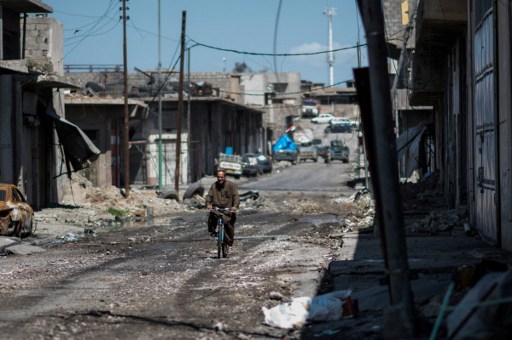Terror group ISIS has been pounded with consecutive strikes targeting the very foundations of its self-proclaimed “caliphate.” Military defeats in Syria and Iraq have undermined the group’s influence.
Close to losing Mosul, and the battle for driving the terrorists out of their de facto Syria capital, Raqqa drawing nearer, ISIS’ objective has been depreciated from “lasting and expansionist” to “save what’s left.”
With massive tracts of land still under its control, compared to its terror counterparts, ISIS is far from being fully wiped out of existence, even though the upbeat in fierce battles has severely afflicted the group’s fighting power. ISIS has lost manpower, funds and composure.
Despite all that being said, ISIS as an ideology is here to stay long after the group is dislodged from its bastions in Iraq and Syria.
ISIS represents a threat beyond the defining borders of its self-claimed “caliphate” in Iraq and Syria in June 2014. Its danger stretches into the unreasonable conditions it created, and that would outlive the organization’s demise.
Many terror offshoots, conveniently small in size, have exploited the ISIS-orchestrated chaos storming the region, whether in Syria, Iraq, Libya, Yemen or even Egypt’s Sinai Peninsula. This status quo plays into the hands of ISIS proxies staging terror attacks on an international level. Seeing that multilateral parties benefit off the Middle East conflict, terrorist attacks ravaging the world will continue.
ISIS might be in deep waters in Syria and Iraq, but the violence will not cease—it goes without saying that the end of war does not necessarily mean the start of peace.
Observing ISIS jumping into the fray, we should be reminded that the organization still actively exploits social media platforms more efficiently than other terror groups. It is saddening to see that ISIS malicious propaganda and media warfare are not receiving blows proportional to its field losses.
Virtually speaking, real-time battles should present a tougher challenge on the scales of dangers and costs. But the opposite is being proven on daily basis, cyber warfare and the manipulated social media arenas see to ISIS’ expansion and survival.
ISIS online propaganda continues to rally fresh cannon fodder and provoking violence. It is quite unbelievable that actual war has become an easy task when compared to confrontation on a virtual battlefield.
“Once Raqqa is liberated after Mosul, we will see the beginning of the end of this terrible caliphate,” British Defense Secretary Michael Fallon has said. Followed by incessant military operations, ISIS’ end as a “caliphate” is inevitable. It is merely a matter of time.
Nevertheless, the danger to ISIS in it being the first-ever terror organization to claim such fierce and untold violence remains unaccounted for. The group might end in its present form, but smaller ISIS-styled anomalies will breakaway as the mother group dissolves. These terror branches will be found nestled in destabilized areas, and of course in the boundless cyber world.
